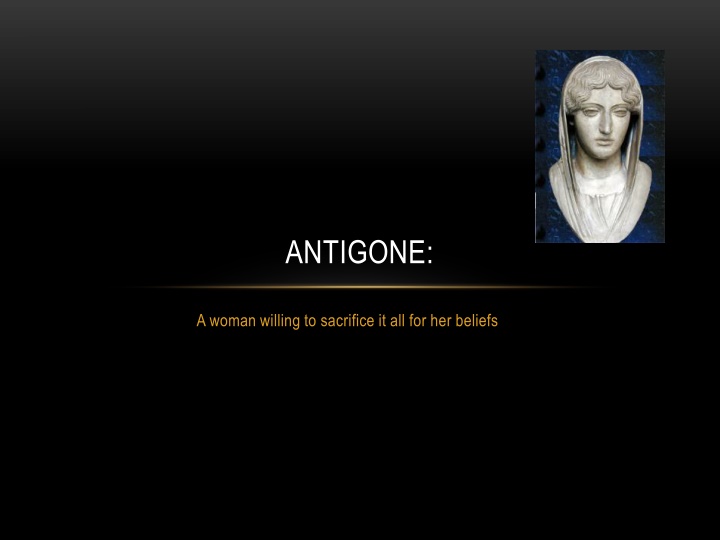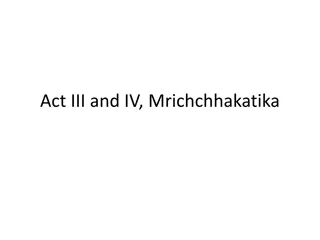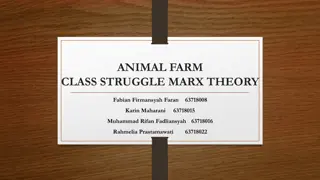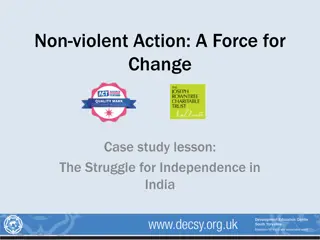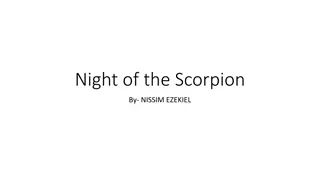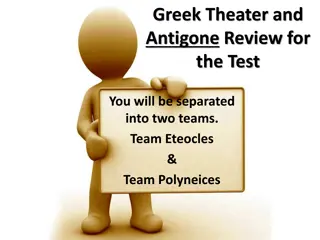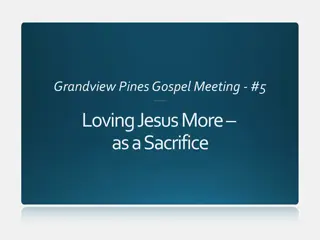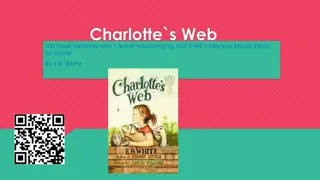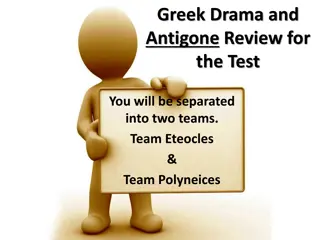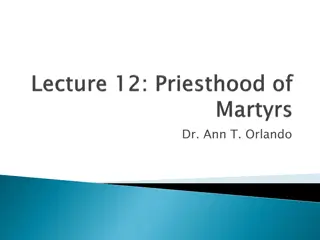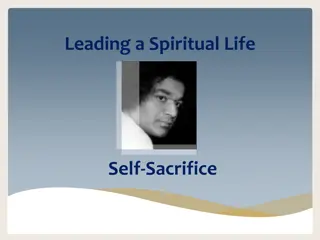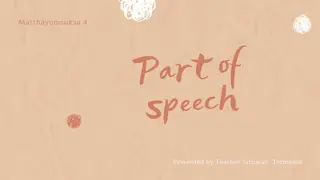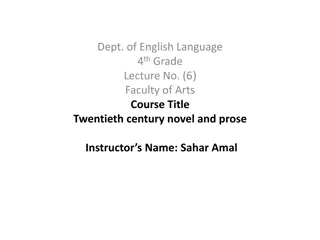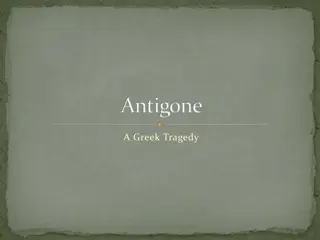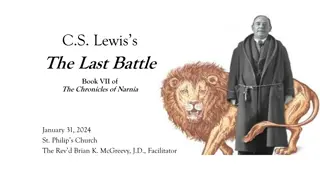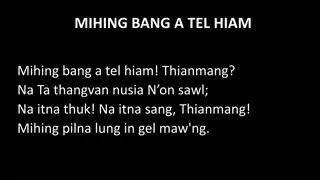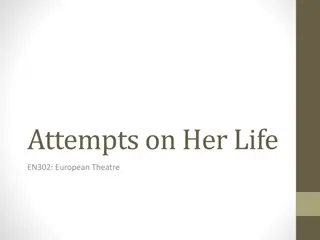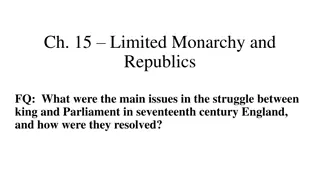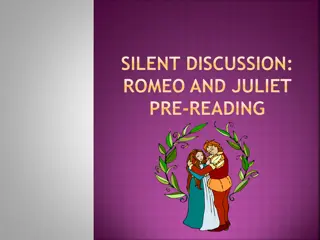Antigone's Struggle: A Tale of Sacrifice and Defiance
Antigone, a woman of strong beliefs, defies the law to honor her brother, Polyneices, despite Creon's decree forbidding his burial. Conflict escalates as Antigone's actions challenge the authority of the state and the gods, leading to a tragic outcome. The play explores themes of loyalty, family duty, and the consequences of pride and stubbornness.
Download Presentation

Please find below an Image/Link to download the presentation.
The content on the website is provided AS IS for your information and personal use only. It may not be sold, licensed, or shared on other websites without obtaining consent from the author.If you encounter any issues during the download, it is possible that the publisher has removed the file from their server.
You are allowed to download the files provided on this website for personal or commercial use, subject to the condition that they are used lawfully. All files are the property of their respective owners.
The content on the website is provided AS IS for your information and personal use only. It may not be sold, licensed, or shared on other websites without obtaining consent from the author.
E N D
Presentation Transcript
ANTIGONE: A woman willing to sacrifice it all for her beliefs
ACCORDING TO SEVEN AGAINST THEBES Eteocles and Polyneices remained in Thebes, where Jocasta's brother Creon was ruling as regent. When the boys were grown, they agreed to rule Thebes alternately. Eteocles ruled first, but when his year was up he refused to relinquish the throne to Polyneices. Polyneices, who had married the daughter of the king of Argos, led the Argives and six other cities in an assault on Thebes (The Seven Against Thebes). Thebes drove off the attackers, but in the course of the battle the two brothers killed each other. Their uncle Creon assumed the throne and decreed that Eteocles was to be buried with honors but his brother Polyneices was to be left unburied, to rot in the sun and be eaten by scavengers.
ANTIGONE PROLOGUE AND PARADOS RECAP Setting: Thebes, just after a war between the two sons of Oedipus both have died and Creon is now the king. At night Antigone slips out the door of the palace meeting her sister, Ismene, in secret. Antigone: How many griefs our father Oedipus handed down! (59) JUXTAPOSITION: Eteocles gets full military honors and goes down with glory among the dead (60). For Polynices, Creon forbids anyone to bury him, even mourn him (60). PERSUASIVE APPEALS: Ismene reminds her sister how our father died, hated, his reputation in ruins, driven on by the crimes he brought to light himself we will be destroyed by our own crimes. Now look at the two of us, left so alone, she says, pointing out that they are even more vulnerable single women. She tells Antigone they must be sensible and not rush to extremes (62). MARTYR: Antigone defiant, refuses to give up her cause, but rather die for it-- I will suffer nothing as great as death without glory (64).
ANTIGONE EPISODE 1 RECAP: EXPOSTION: Creon calls a meeting of the elders of Thebes, his advisors, played by the CHORUS. SHIP MOTIF: He declares that the ship of state is safe, after the war. FORESHADOWING: He describes what a good leader should be, setting forth his authoritarian opinion on the matter. This foreshadows his ultimate demise. CONFLICT: The body of Polynices has been buried, which is forbidden. TONE: Creon says, stop, before you make me choke with anger! APOSTROPHE: Money you demolish cities. CHORAL ODE (STASIMON): the wonders of man , foreshadows the demise of Creon, due to his hubris.
ANTIGONE EPISODE 2 RECAP: IMAGERY: the corpse of Polynices slimy, going soft (80) SUPERNATURAL FORCES: a black plague of the heavens (80) JUXTAPOSITION of SIMILES: like a bird (female) (80) and like hunters (male) (81) TONE: Creon: You had the gall to break this law? (81) and Antigone: fool (82). CENTRAL CONFLICT: the laws of the gods vs. the laws of the state CHORUS as MEDIATOR: She hasn t learned to bend before adversity (83). FIGURATIVE LANGUAGE: Iron and horses. Her will could be broken. HUBRIS: She is the man if she goes free (83). REINFORCING WOMEN S ROLES: No woman is going to lord it over me (86). ANIMAL IMAGERY: Viper, sucking my life blood (86). APOSTROPHE: Haemon, your father wrongs you so! (89). WAVE/WATER IMAGERY: cresting on and on from one generation (91). FORESHADOWING: blinding ruin (92).
ANTIGONE: EPISODES 1 AND 2: WHAT DO YOU KNOW?
A challenge among sisters: You ll soon show what you are, worth your breeding, Ismene, or a coward for all your royal blood (60).
A death-wish: I will suffer nothing as great as death without glory (64).
A brother defiled: He must be left unburied, his corpse carrion for the birds and dogs to tear (68).
She breaks the law: She crowns the dead with three full libations (80).
Captured, she stands defiant: These laws I was not about to break them, not out of fear of some man s wounded pride (82).
He shows no mercy: She is the man if this victory goes to her and she goes free (83).
His fate is now sealed: the man the gods will ruin (92).
CREON AS TRAGIC HERO: HUBRIS Why, if I bring up my own kin to be rebels, think what I d suffer from the world at large (94). Never let some woman triumph over us (94).
FATHER VS. SON: ARGUMENT IN STICHOMYTHIA Stichomythia is quick-paced responses of back and forth dialogue. It contrasts with the long form of argument or debate at the opening comments of each character in a scene. ACTIVITY: Read your portion of pages 96-98: As you read, note the effect of the quick paced dialogue on the tension and conflict between the father and son. What is his son s perspective? How does he support his argument? What is the father s perspective? How does he support his argument? How do their reactions heighten the tension of the scene?
CREON ISSUES HIS OFFICIAL DECREE FOR ANTIGONE, SEALING HIS FATE I will take her down some wild, desolate path never trod by men and wall her up alive in a rocky vault Creon s choice of death for Antigone and set out short rations, just the measure that piety demands to keep the entire city free of defilement Protecting the city There let her pray to the one god she worships: Death Insult to the gods
ANTIGONE EPISODE 3: CHORAL ODE (101) Apostrophe (speaking to abstract idea, object or character not present) Love as central figured personified in the gods Pairing of innocence and violence Warm glance of the bride and guarding a girl s soft cheek kindred strife, father and son at war and conquered in battle
KOMMOS: LYRICAL SONG OF LAMENTATION Literally means striking as in beating of the self in mourning The Chorus and dramatic character sing together When tension of the play rises to a climax of grief or horror In Oedipus occurs when Oedipus arrives on stage after his blinding In Antigone occurs when Antigone arrives at the cave in which she is to be buried alive
ANTIGONE EPISODE 4: APOSTROPHE AND ALLUSION Antigone is led to the cave in which she is to be buried alive. These are her final words: ANTIGONE S APOSTROPHES: Spoken to her family members who aren t present - Mother your marriage bed doomstruck mother (103). - Brother, your marriage murders mine (103). - But still I go, cherishing one good hope: my arrival may be dear to father, dear to you my mother (105). THE CHORUS ALLUSIONS: to three mythological tales to emphasize role of IMPRISONMENT and FATE -Danae: Imprisoned mother of Perseus -Lycurgus: Imprisoned and killed for disrespect to Dionysus -Cleopatra: Her sons were imprisoned and blinded my the other queen
IRONY TYPES: Situational: the least expected thing happens, the opposite of expectation Ex: When you study all night for the test, but it is cancelled. Antigone/Oedipus: blind seer, Tiresias (stock character) Verbal: someone means the opposite of what he or she says Ex: We have another fun trip to the dentist today to fill my cavities. Dramatic: Contrast between what the audience knows and the character does not know Ex: Horror movies we know that the fun swim in the ocean will lead to the teens being torn apart by a hungry shark.
ANTIGONE: EXODUS PERIPETEIA: (reversal of circumstances) Creon was a man to rouse your envy once and now it s all lost and gone (119). Sophocles plays on audience expectation in this scene Creon expects to earn forgiveness, but instead is tragically punished by the gods. OXYMORON: (contradictory pair of words) living corpse : Reference to both Creon (dead in spirit though physically alive) and Antigone (buried alive) JUXTAPOSITION: (contrast) violence-wedding imagery: strangled in her veils and bed of his marriage blighted by misfortune (122)
ANTIGONE: EXODUS, CONT. ANAGNORISIS (sudden realization of the truth and tragic hero takes responsibility ) my crimes , my plans, my mad fanatic heart , I ve learned through blood and tears (124). CATASTROPHE: (final tragic resolution) She stabbed herself at the altar (Altar as symbolic of religion and sacrifice) and She called down torments on your head (126). CATHARSIS: (emotional release of pity and fear) I admit it all! Take me away out of sight. I don t even exist I m no one. Nothing (126). Note stage directions/body language: kneeling in prayer (127). DENOUEMENT: (resolution/closing of the story) Wailing wreck of a man (127). MORAL MESSAGE: (secondary goal of tragedy) The mighty words of the proud are paid in full (128). Warning to audience about hubris
